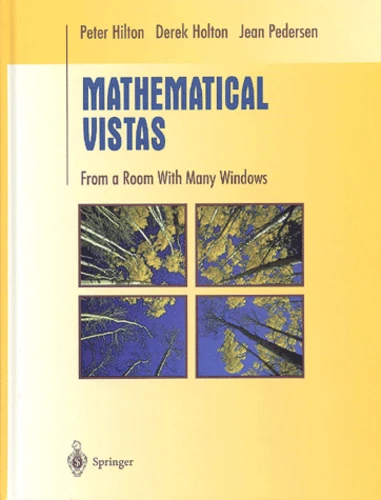Mathematical Vistas. From a Room with Many Windows
Par : , ,Formats :
- Paiement en ligne :
- Livraison à domicile ou en point Mondial Relay estimée à partir du 10 décembreCet article sera commandé chez un fournisseur et vous sera envoyé 10 jours après la date de votre commande.
- Retrait Click and Collect en magasin gratuit
- Livraison à domicile ou en point Mondial Relay estimée à partir du 10 décembre
- Réservation en ligne avec paiement en magasin :
- Indisponible pour réserver et payer en magasin
- Nombre de pages335
- PrésentationRelié
- Poids0.79 kg
- Dimensions18,4 cm × 24,2 cm × 2,2 cm
- ISBN0-387-95064-8
- EAN9780387950648
- Date de parution25/01/2002
- CollectionUndergraduate texts in maths
- ÉditeurSpringer
Résumé
The purpose of this book, like that of its earlier companion volume, Mathematical Reflections, is to provide a relaxed and informal treatment of several mathematical topics that will convey to the reader-presumed to have the mathematical maturity of, say, a bright freshman at an American university or college-a sense of the pleasurable excitement that accompanies genuine mathematical discovery. The text presents nine topics in nine chapters. Several of the topics are related to one another, but the chapters may be read in any order preferred by the reader. Each topic is treated with what the authors regard as the attention to detail appropriate to its level of difficulty. These topics range from Andrew Wiles' famous proof of Fermat's Last Theorem, where the key ideas are presented, but no attempt et completeness is made, to the discussion of paradoxes in which all relevant arguments are given in full. Each chapter is provided with "Breaks," in which readers can test their understanding of the material just presented by answering questions.
The purpose of this book, like that of its earlier companion volume, Mathematical Reflections, is to provide a relaxed and informal treatment of several mathematical topics that will convey to the reader-presumed to have the mathematical maturity of, say, a bright freshman at an American university or college-a sense of the pleasurable excitement that accompanies genuine mathematical discovery. The text presents nine topics in nine chapters. Several of the topics are related to one another, but the chapters may be read in any order preferred by the reader. Each topic is treated with what the authors regard as the attention to detail appropriate to its level of difficulty. These topics range from Andrew Wiles' famous proof of Fermat's Last Theorem, where the key ideas are presented, but no attempt et completeness is made, to the discussion of paradoxes in which all relevant arguments are given in full. Each chapter is provided with "Breaks," in which readers can test their understanding of the material just presented by answering questions.


